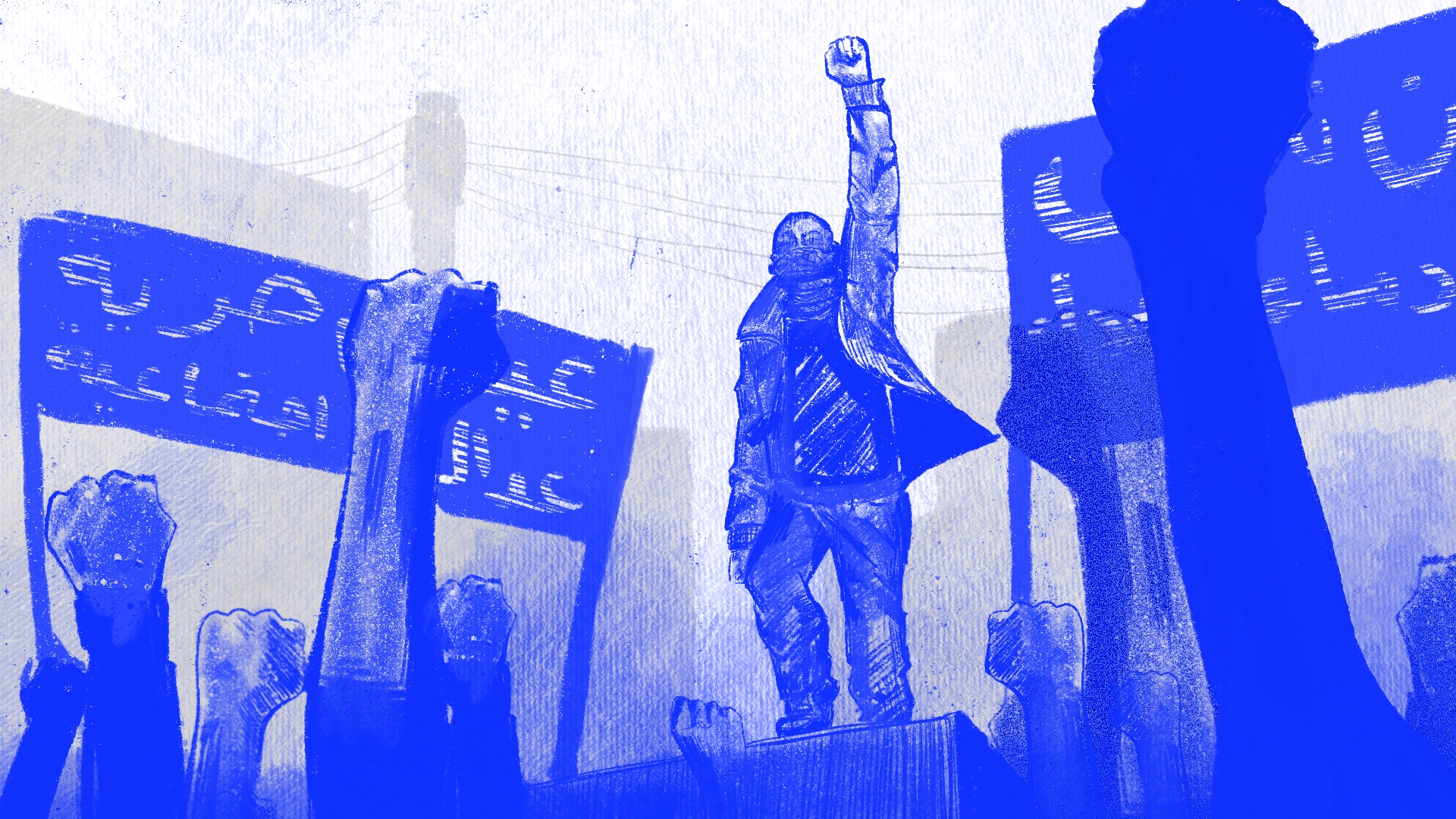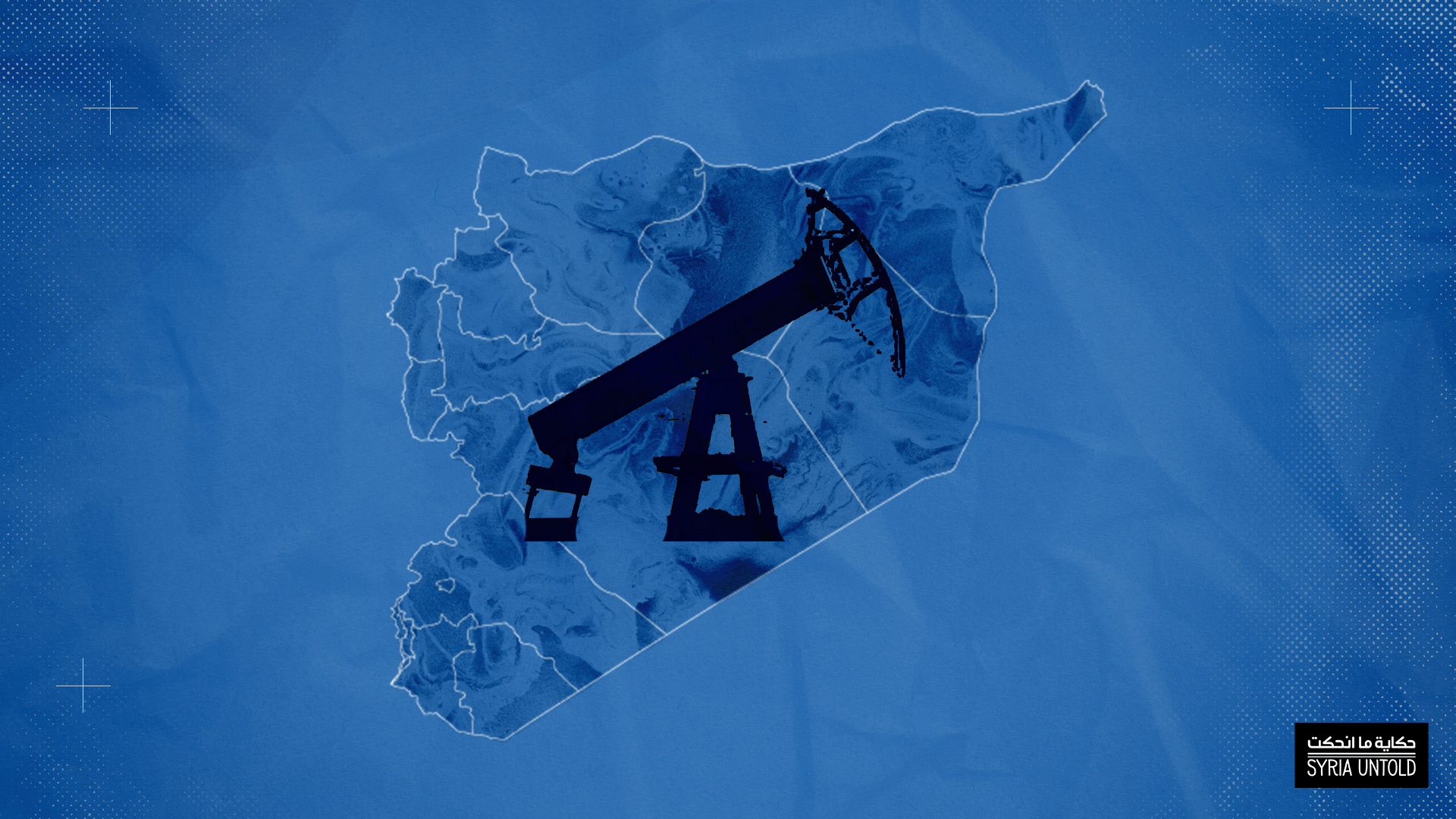“This article was produced within the project «Empowering the Next Generation of Syrian Women Journalists» in partnership between the «Syrian Female Journalists Network» and «UntoldStories». This article was produced under the supervision of journalist Zeina Kanawati”.
In 1967, after the occupation of the Syrian Golan Heights, Abou Ali and his family became internally displaced upon moving to Damascus. From a young age, he decided to rely on himself to support his family, and after ten years of hard work, he managed to buy a house in one of Sayyida Zainab’s neighborhoods.
Abou Ali settled in rural Damascus for about 35 years, where he owned a store near the shrine of Sayyida Zainab and a house in its neighbourhood. However, following the start of the war in Syria, he was forced to flee for the second time in 2013 and seek refuge in a neighbouring country.
When Abou Ali left Syria, he had no documentation to prove ownership of his store and house, having fled the area in a hurry after the massacre that took place in Sayyida Zainab during the funeral of a young man in July 2012. Despite his many attempts to prove ownership, he wasn’t able to. In 2016, he learned that one of the militias took over his house and settled in it after repairing it from damages caused by shelling and other aggressions.
“I gave a lawyer residing in Syria power of attorney so she can try to obtain my property number,” says Abou Ali, “but the area surveyor refused to check the house because he was colluding with those who took over my property.”
Sahel Protests. Repression Prevail
08 December 2023
None of the residents in the area possess a “green title deed” for their homes, which force the majority of them to pay electricity bills to obtain proof of ownership. This deed is a document that confirms someone’s ownership of a specific property. It is usually stamped by the real estate registry office and is used in areas that have already been surveyed.
According to several studies, the area of Sayyida Zainab in Southern rural Damascus is considered one of the regions that were “demographically engineered” by the Syrian government and its Iranian ally. They did so under the pretext of protecting the shrine of Sayyida Zainab as well as solidifying their military and social foundations.
Laws Supporting Control over Homes of Refugees
On August 4th, 2015, the Syrian government issued “Circular No. 4554” to the Ministry of Local Administration, which mandates that Syrians wishing to sell or rent their houses and shops must obtain approval from security branches before doing so.
In addition to this circular, Law No. 10 stipulates the establishment of regulatory zones in demolished Syrian cities and towns whose owners have now become refugees and IDPs. This law imposes a specific timeframe for property owners in each designated area to return to Syria and provide proof of ownership. This measure effectively deprives those who have been displaced from claiming ownership due to these challenging requirements.
In late 2019, the People’s Assembly of Syria approved an amendment to the Conscription Service Law (mandatory military service), which granted the Syrian government control over the properties and assets of those who evade military service and fail to pay the required cash fee. Paragraph “H” of this law was modified as well, stating that the fee for non-compliance is due when the individual surpasses the age of 42, according to the Public Assets Collection Law. The amendment also allows for the executive seizure of their assets without prior notice.
In May 2023, the Syrian Network for Human Rights released a report addressing the consequences of the laws enacted by the Syrian government, which empowered the state to take control of lands and properties of approximately 12 million Syrians who fled the war during the past decade. The report urged the United Nations High Commissioner for Refugees to shed light on these laws, since they create a major obstacle for the right to return.
“Yesterday’s Houses”
Um Rami, who owns a three-story house in Southern rural Damascus, was forced to move to another area with her family after her neighbourhood was evacuated. She sought refuge in Jordan in 2014 but came back to Syria a year later after her eldest son was deported because he was working illegally in a bakery. She settled in Damascus and said: “for ten years, I haven’t been able to go back home and see the house with my children. I received news that some militias took control of it, and they are currently occupying two floors. I can’t ask them to evacuate nor to pay rent.”
Um Rami now lives in a house on the outskirts of Damascus and pays a significant amount in rent. She doesn’t have any documents proving ownership of her house nor is she able to return due to militia control. She previously tried to sell the house to relieve some of her financial burdens. “They offered me less than a quarter of its price because they knew that I wouldn't be able to go back nor to claim the house as my own.”
Abou Ammar, a Syrian refugee in Jordan, left the Al-Asali area in Damascus in 2012 after a massacre committed by the Fourth Division, which led to the displacement of many.
On August 4th, 2015, the Syrian government issued “Circular No. 4554” to the Ministry of Local Administration, which mandates that Syrians wishing to sell or rent their houses and shops must obtain approval from security branches before doing so.
“My house has three floors, but I can’t do anything with it despite me owning a green title deed. The government denies me permission to renovate. I also received news two months ago that my house was completely demolished.”
Abou Ammar and his father own several buildings along the Al-Asali road; however, they do not have the right to manage, sell, or rent them despite their challenging financial situation in the country of refuge. “To this day, the Syrian government has not allowed those who were displaced to come back. About a year ago, the Fourth Division started demolishing houses and prevented their official owners from having any control over them.”
Procedure for proving home ownership
Property owners in regulated zones have a 30-day window to submit documents proving ownership to local authorities. If those documents are unavailable, residents or owners can file a lawsuit within 30 days before those authorities and provide alternative evidence; such as indicating the property’s location, borders, their shares in it, the legal type of the property (commercial or residential), in addition to any lawsuits filed by the owners or against them.
When the owners are unable to file the claim themselves, some of their relatives or legal representatives can do so on their behalf. However, relatives hold the burden of proving that the original owners are unable to personally file the claim. Furthermore, legally recognized agents must be appointed by property owners and should obtain security permits from the relevant Syrian agencies. Relatives are also required to prove their relationship with the owner.
If the owner doesn’t submit the claim or lawsuit within 30 days, ownership reverts back to the town, district or city in the regulated zone, and the owner is not compensated. In addition, the law doesn’t provide the right to appeal this decision.
Refugees are pressured to return
In recent months, the Syrian regime regained its seat at the Arab League and other diplomatic arenas, which raised concerns among Syrian refugees in neighbouring countries about being forced to return under the pretext of a “safe Syria.”
In this context, Abou Ali states that after “the regime’s return to the Arab League, the UNHCR started reducing and cutting off assistance entirely to refugees inside and outside camps. They always speak of “voluntary return, but what’s really happening is the use of pressure tactics and restrictions on refugees to force them to return.”
It's also worth mentioning that the United Nations World Food Programme announced in July 2023 that further reduction in food assistance for refugees in Jordan has become inevitable due to funding limitations. The program will be forced to reduce its monthly aid value by a third for all 119.000 Syrian refugees in the Zaatari and Azraq camps.
Um Moatasem, a Syrian widow who used to live in the Al-Hajar Al-Aswad area in rural Damascus, recalls that they were displaced in August 2012, just two weeks after the death of her husband. She then moved to Jordan and “in early 2013, we received news that our house was bombed. We used to live in a building with my in-laws, and our house was completely destroyed due to bombing and looting.”
Um Moatasem is currently trying to rebuild her house with minimal costs, as she intends to rent it out to someone in the area before it’s taken over. “This house is what remains for my children after the death of their martyr father. They are also working hard to secure six million Syrian pounds to renovate the house. As a woman, it’s difficult for me to manage the property or to transfer ownership to my children at this stage,” she says while describing the difficulty of dealing with property ownership in rural Damascus.
Anas Awad, a journalist living in Turkey, states that the Syrian government sought control over all of its opponents’ houses in Zamalka where he used to live. “My uncle and I owned an entire building. After residents were forcefully displaced, the Syrian government sent eviction notices to everyone there. In 2019, they took control and sealed it with red tape,” he says. Anas’ family currently resides in the North and do not have the right neither to object nor to reclaim their properties.
From a legal perspective, lawyer Khaled Al-Helou states that “40% of Syria’s cities are unorganized and undesignated for construction. They emerged after the occupation of the Syrian Golan Heights and of Palestine. The legal characterization of these areas is one of “encroachment”, but the regime halted regulatory plans and thus contributed to their creation.
Al-Helou considers that “militias seizing properties of refugees is a criminal offence as it prevents owners from exercising their right to use, sell and lease their properties. However, what is even more dangerous is ownership transfers through forged claims between the property transgressor and owner, which has already happened to many refugees.”
The issue of informal settlements and their spread in Damascus and its surroundings is not new. The Central Bureau of Statistics in Syria estimates that 50% of housing in the country is informal, while approximately 45% of residents in Damascus live in random houses and violation areas.
A study conducted by Syrian organization “The Day After” on property rights highlights a correlation between reconciliation processes and demographic changes. In other words, evacuating areas was not a temporary military tactic, but part of the regime’s plan to secure a population composition that aligns with its vision and that of its allies, through explicitly taking advantage of sectarian and denominational dimensions.
“I have received many death threats from militias controlling my house,” says Abou Ali, who was initially displaced from the Golan Heights and is currently a refugee from the Sayyida Zainab area. His situation is similar to that of many who cannot access their properties, for different reasons.








